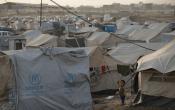Turkey
Operation: Turkey
Location
{"longitude":35,"latitude":39,"zoom_level":0}
Latest update of camps and office locations 21 Nov 2016. By clicking on the icons on the map, additional information is displayed.
Key Figures
| 2016 end-year results | |
| 445,200 | Syrian refugees living in urban areas received one-off cash grants |
| 353,900 | people received services from UNHCR-funded outreach centres |
| 79,700 | non-Syrian people of concern were registered |
| 28,900 | refugees had their cases submitted for resettlement |
| 22,400 | non-Syrians with specific needs were provided with emergency cash assistance, accommodation, local travel, or medical assistance |
| 750 | new DAFI scholarships were provided for Syrian students |
| 2017 planning figures | |
| 274,000 | people will receive psychosocial support |
| 27,000 | people will depart for resettlement |
| 100% | of people of concern approaching UNHCR will be provided with information on registration procedures |
| 100% | of targeted households will have their basic needs met with multi-purpose cash assistance |
Latest Updates and Related Links
People of Concern
13%
Increase in
2016
2016
| 2016 | 3,116,156 |
| 2015 | 2,754,540 |
| 2014 | 1,694,838 |

[["Refugees",2869421],["Asylum-seekers",245955],["Stateless",780]]
Loading ...
Turkey
< Back
2016
{"categories":[2012,2013,2014,2015,2016,2017],"budget":[70.97829772,225.55840126,318.39765287,336.38575258,350.92322574,367.9917746],"expenditure":[38.94669135,68.32344618,95.80975934,82.07968733,126.86572147,null]}
{"categories":[2012,2013,2014,2015,2016,2017],"p1":[70.93429772,225.38501039,318.35365287,336.31575258,350.87922574,367.9889846],"p2":[0.044,0.17339087,0.044,0.07,0.044,0.00279],"p3":[null,null,null,null,null,null],"p4":[null,null,null,null,null,null]}
{"categories":[2012,2013,2014,2015,2016,2017],"p1":[38.93926035,68.28227643,95.80975934,82.06007284,126.86331129,null],"p2":[0.007431,0.04116975,null,0.01961449,0.00241018,null],"p3":[null,null,null,null,null,null],"p4":[null,null,null,null,null,null]}
Loading ...
CHOOSE A YEAR
- 2014
- 2015
- 2016
- 2017
Working environment
A number of political developments took place in Turkey in 2016. These included the resignation of the former Prime Minister in May 2016, the declaration of a State of Emergency following the failed coup attempt on 15 July, the subsequent changes in various state institutions and organizations, as well as the proposed constitutional amendment introducing a presidential system.The security situation remained volatile with a number of terrorist attacks, including two in Ankara city centre, two in Istanbul and suicide bombings in Gaziantep, Kayseri and Adana.
Turkey’s protection regime was further strengthened in 2016 with two regulations covering Syrians and non-Syrians, which govern procedures for work permit applications of refugees and asylum-seekers in Turkey.
A breakthrough development for UNHCR was the signature of the Host Country Agreement on 1 September, which formalized and strengthened UNHCR’s long-standing cooperation with Turkey.
Population trends
- Since 2015, Turkey has been the world’s largest refugee hosting country.
- By end 2016, according to the Directorate General of Migration Management (DGMM), over 2.8 million Syrians were registered in Turkey, out of whom nearly 260,000 were hosted in camps while the rest were residing in host communities. This reflects a 13 per cent increase compared to 2.5 million registered as of end 2015.
- According to UNHCR records, Turkey hosted over 285,000 refugees and asylum-seekers from other countries, mainly from Iraq and Afghanistan. Close to 79,700 non-Syrian people of concern were registered with UNHCR in 2016, totalling a 41 per cent decrease compared to the previous year.
Achievements and impact
- UNHCR’s leadership of the Regional Refugee and Response Plan (3RP) and the Regional Refugee and Migrant Response Plan (RMRP) was strengthened by the creation of dedicated Inter-agency Coordination Units both in Ankara and in Gaziantep.
- New working groups and inter-sector technical working groups were created in Ankara and in the field, which included the creation of a sexual and gender-based violence (SGBV) sub-working group led by the Ministry of Family and Social Policies, a child protection sub-working group co-led by UNHCR and UNICEF, a cash-based interventions technical working group co-led by UNHCR and WFP, and an information management working group led by UNHCR.
Unmet needs
- Although in 2016 UNHCR was able to expand its presence in satellite cities thanks to increased donor support, the outreach coverage is still insufficient to reach a highly dispersed population.
- Due to limited funding, UNHCR’s regular cash assistance covered less than 2 per cent of the total non-Syrian caseload, while UNHCR estimates that the vulnerability level is much higher.
Turkey is now the largest host country of refugees under UNHCR’s mandate in the world, hosting more than 2 million refugees and asylum-seekers from various countries. Instability in the region is expected to persist in 2016, preventing the safe return of refugees from Turkey and likely resulting in continued arrivals to the country.
After the entry into force in 2014 of the Law on Foreigners and International Protection (LFIP) and the Regulation on Temporary Protection (TP), Turkey is in the midst of establishing and implementing a State-owned and rights-based asylum framework. UNHCR will advocate for the streamlining of protection for people of concern under the LFIP and TP, and will further support the Government of Turkey, at both central and provincial levels, to discharge its protection role.
In line with the inter-agency Regional Refugee and Resilience Plan (3RP) and UNHCR’s Global Strategic Priorities, the Office will continue to support the Government’s implementation of the TP Regulation; monitor Syrian refugees’ access to rights and entitlements; and intervene with local and central authorities in order to facilitate the application of the legal framework. While continuing to provide support for infrastructure facilities and basic non-food items in refugee camps, particular focus will be placed on expanding outreach and assistance to out-of-camp refugees, especially the most vulnerable.
UNHCR will also assure the timely registration of new arrivals from Iraq, and the prompt identification of people with specific needs who require referral to national protection and assistance services. The Office will also strengthen its outreach efforts to out-of-camp Iraqis, and continue to assist Iraqis hosted in refugee camps.
UNHCR’s strategy for refugees from other countries will include:
a) supporting efforts to strengthen the State asylum system and service provision;
b) reinforcing the role of judiciary and bar associations;
c) expanding the network of partners and building their capacity in protection monitoring and outreach;
d) supporting self-reliance and facilitating access to services including education; and
e) strategic use of refugee status determination, mainly for the purpose of resettlement processing.








